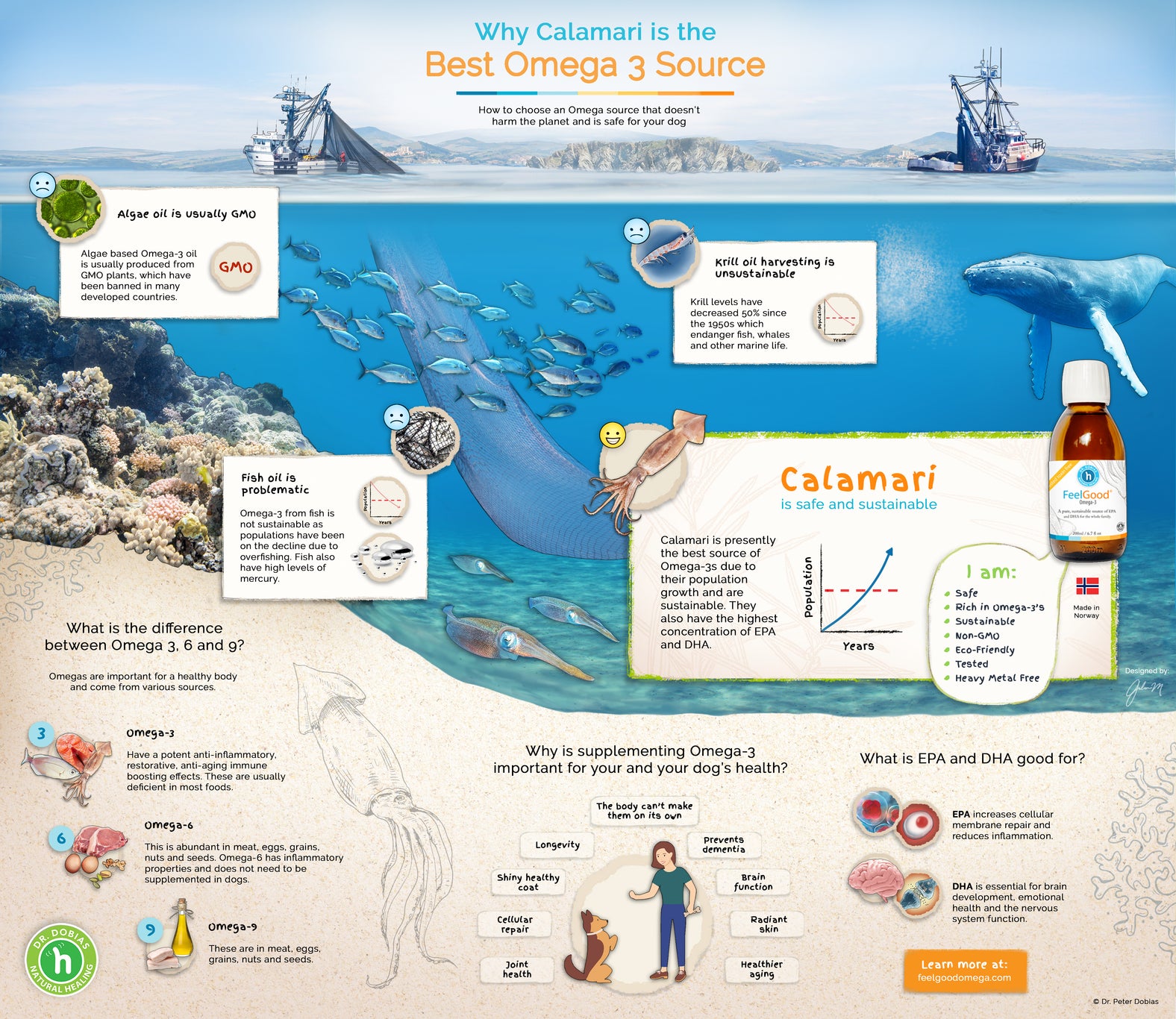
How do you choose an Omega-3 oil for dogs?
From the outside, sourcing a relatively simple product might seem easy, but sourcing the right and safe Omega-3 is like looking for a needle in a haystack.
What are Omega-3 oils?
Omega oils are also known as essential fatty acids (EFAs), and can be divided into three main groups: Omega-3, 6 and 9.
They are essential because they are vital to your dog’s health and dogs can’t make them on their own. You may be familiar with the traditional cod-liver oil, or other fish oils from your childhood, however, such oils are no longer considered safe.
Are there any safety concerns when choosing the best Omega-3 oil for your dog?
Many dog lovers make serious mistakes when it comes to choosing an Omega-3 oil, because they are unaware that fish oil is usually high in heavy metals, algae oil is GMO, and krill oil threatens the essential food source for whales and fish.
Is sardine oil any better?
Sardines used to be a great source of Omega-3 as small fish are low on the food chain therefore their mercury content is lower.
Sardine and herring oil appear to have elevated levels of strontium, a radioactive element that has been released in large quantities from the Fukushima nuclear plant disaster. Strontium deposits in the bones of fish, and small fish such as sardines are processed with their bones.
Are plant based Omega-3 oils good for you dog?
Unfortunately plant based oils such as flax seed, rape seed, and other seed oils, have a high content of ALA (alphalinoleic acid) which needs to be converted into EPA and DHA. Dogs are not able to convert ALA well.
Can coconut oil be a substitute for Omega-3?
Coconut oil contains mainly medium-chain fatty acids which are very different from Omega-3.
Is algae oil a possible source of Omega-3?
All of the algae oil on the market that we have found has been made from GMO (genetically modified organisms).
Sourcing a safe, sustainable, non-GMO, strontium and heavy metal-free Omega-3 supplement for dogs can be a bit of a challenge, but there is one solution.
An Omega-3 source you can feel good about
Calamari oil (squid oil) is a safe, mercury and heavy metal-free, sustainable source of Omega-3 essential fatty acids.
Research has shown that the squid population has been on the rise since the 1950s, and scientists suggest this increase may be a result of climate change and a decrease in the number of squid-eating fish.
*We found squid met all of our criteria for a quality Omega-3 source: It has a great balance of EPA and DHA with extremely low toxin levels and a steady population rise for over 50 years.
Calamari (squid) are low on the food chain living only one to two years which makes them super-adaptable to changing ocean conditions and low in toxins and heavy metals.
They are a rich source of EPA and DHA, the most valuable Omega-3s that are important for cell regeneration, tissue repair, anti-inflammatory effect, organ and brain function. Your dog’s body is not able to make EPA and DHA on its own.
How is calamari (squid) oil different from other Omega-3 oils?
Analysis confirms that calamari oil contains double the amount of DHA than EPA, which makes it very unique.
DHA is essential for preventing premature aging, degeneration and brain and nerve disease.
EPA is the anti-inflammatory component of calamari oil, it supports your dog’s mobility, joint health, shiny coat and healthy skin.
The choices we make matter
There is not a day when we do not hear about the negative impacts of overfishing and environmental pollution, but the situation does not need to be hopeless. Making the right choices can help to restore fish and krill stocks and one such choice is to use calamari (squid oil).
Are Omega-3s good for sore joints, arthritis and back pain?
Absolutely! In fact, research confirms that Omega-3s are as effective as NSAIDs (non-steroidal anti-inflammatory drugs) without the side-effects of vomiting, and kidney and liver disease.
How about skin problems and allergies in dogs?
One of the best and most profound effects of a high quality Omega-3 oil is healthy skin and coat. Allergies are also known to respond well to a balanced diet containing Omega-3.
Does it matter how Omega-3 oils are made?
Besides a high level attention to detail and cold oil processing, it is also important to ensure that an oil is packaged in glass and preserved with nitrogen gas to prevent it from going rancid.
Plastic bottles leach estrogen-like chemicals into the oil, which can alter hormonal balance and contribute to cancer formation.
Want to see how we make FeelGood Omega? Check out the video below!
Do I need to supplement Omega-6 or 9 ?
The simple answer is no.
Omega-6 is abundant in meat, eggs, grain, nuts, seeds, and Omega-9 EFA’s are common components of animal fat and vegetable oils.
When compared to the ancient diets of canines and humans, the current diet has much higher proportions of Omega-6 and 9 compared to Omega-3. This is why it is important to supplement Omega-3.
This is the reason many dog lovers see a profound change in their dogs when they start supplementing with an Omega-3 rich in EPA and DHA.
This is why my dog Pax and I take FeelGood Omega.
Learn more about omega oils here:
Further reading:
Omega‐3 Fatty Acids in Boxer Dogs with Arrhythmogenic Right Ventricular Cardiomyopathy (2008)
The definitive guide to calamari oil
© Dr. Peter Dobias, DVM
